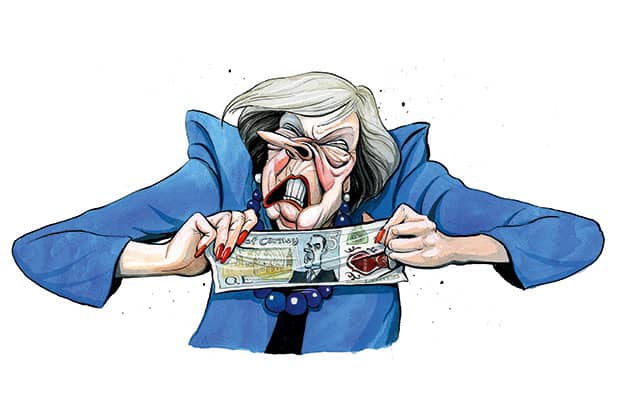On this week’s podcast, we discuss the fraught relationship between Mark Carney and Theresa May, the similarities between the sieges in Mosul and Aleppo, and why we all have to wait so long at the airport.
First up, this week saw Bank of England Governor Mark Carney announce that he would be stepping down from his post in June 2019. This was the conclusion to a troubled few weeks that started with the Prime Minister’s party conference speech, in which she spoke of the ‘bad side effects’ to recent monetary policy. So what’s the future for Carney and the Bank of England? And will May need to recalibrate her relationship with the central bank? These are the issues that James Forsyth tackles in his cover piece this week, and on the podcast he explains that:
“It all started with Theresa May’s party conference speech. I don’t think her team had any understanding of the implication of that line. People saw that outside the hall as a threat to the independence of the Bank of England. Mark Carney himself was very unhappy about this, Philip Hammond was very unhappy – the Treasury hadn’t seen this part of the speech. So this created this row and it played into this whole question of how long is Mark Carney going to stay?”
Sam Bowman, Executive Director of the Adam Smith Institute, was quick to defend Carney, saying:
“Obviously private citizens and the Treasury select committee should be challenging the bank and questioning the bank. It’s a big question about who is actually doing the questioning. What we saw after Theresa May’s comments was not just the pound being sold off but the government bonds being sold off, and this was very worrying for the Treasury, very worrying for anybody who thinks that government’s very low borrowing levels are a permanent feature of British politics. They don’t seem to be, they seem to be contingent on things like the independence of the central bank.”
Next, Iraqi forces are nearing a recapture of the Isis-held city of Mosul. Whilst this seems to be perceived as an unequivocally good thing, the same cannot be said for the siege of the Syrian city of Aleppo, where the Russian and Syrian coalition comes in for routine criticism from the British press. Why is this, asks Peter Oborne in this week’s magazine, when the situations in the two cities are uncannily similar? He tells the podcast that:
“I don’t think that the Western media in general does enough to make the comparison between the two situations. You have a Sunni population in both places, held by insurgent rebels – terrorists – holding large proportions of the population hostage, and you’ve got legitimate, internationally recognised governments at any rate, trying to deal with the problem using foreign air power and special forces.”
Seth J Frantzman, who has recently returned from Mosul, reports on the situation there, saying:
“I’ve been on the frontline with the Kurdish peshmerga and also the Iraqi counter-terrorism forces of the Golden Division, so we saw the last few days as they were basically getting up to the city limits. And we saw the coalition air power, and we saw the refugees. People who had lived under Isis control for two years or more, and who were being, slowly but surely, liberated.”
And finally: we’ve all spent time waiting in airports. Whether we’re flicking through magazines in WH Smith, inexplicably getting our luggage wrapped in clingfilm, or trying to download one of the Spectator’s many excellent podcasts using the 30-minutes of complimentary airport wifi, we all know the soul-sucking tedium of travel delays. Mark Palmer, the travel editor of the Daily Mail, knows them better than most, and he wrote in this week’s magazine about his despair at the current situation:
“Adding insult is the government’s latest solution for dealing with the delays — which is not just cynical but downright devious. You want to jump the queues for which the Home Office is responsible? No problem. But it will cost you. Come up with as much as £17.50 and they’ll have you in the baggage reclaim hall long before your suitcase makes its first revolution of the carousel.”

This podcast is sponsored by Berry Bros. & Rudd, who have long supplied wine for The Spectator. If you’ve always wanted to start a wine cellar, 2016 could be the perfect time. Whether you are looking to buy for future drinking, for investment or a little of both, Berry Bros. & Rudd’s Cellar Plan is designed to suit all tastes and budgets. A personal Account Manager will be on hand to offer advice and assistance, and enable you to benefit from three centuries’ worth of relationships with the leading wine growers. To find out more about starting a wine cellar with Berry Bros. & Rudd, visit bbr.com/cellarplan









Comments